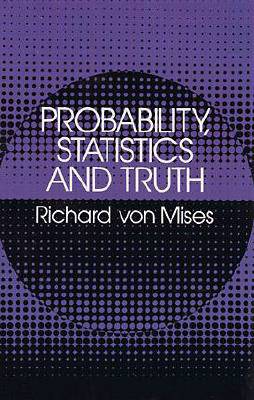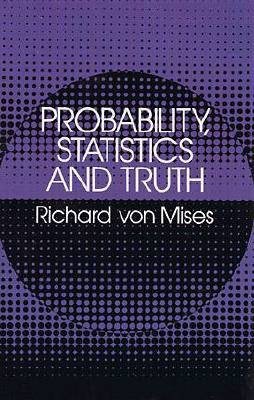
Bedankt voor het vertrouwen het afgelopen jaar! Om jou te bedanken bieden we GRATIS verzending (in België) aan op alles gedurende de hele maand januari.
- Afhalen na 1 uur in een winkel met voorraad
- Gratis thuislevering in België
- Ruim aanbod met 7 miljoen producten
Bedankt voor het vertrouwen het afgelopen jaar! Om jou te bedanken bieden we GRATIS verzending (in België) aan op alles gedurende de hele maand januari.
- Afhalen na 1 uur in een winkel met voorraad
- Gratis thuislevering in België
- Ruim aanbod met 7 miljoen producten
Zoeken
€ 18,95
+ 37 punten
Omschrijving
The science of probability -- the systematic study of mass phenomena and repetitive events -- was not fully established as such until about 1919. Nine years later, Richard von Mises, one of it pioneers, brought out the first edition of this book -- what has become the classic treatment of the foundations of probability theory. The present text reproduces the most authoritative translation of the definitive 1951 German edition, which was fully revised in the light of over two decades of developments in the field.
Step by step, in clear, simple language and with exceptionally well chosen examples, the author unfolds what in all likelihood is still the most comprehensive investigation ever undertaken of probability, its relation to statistic, and its truth-finding value. Professor Richard von Mises (1883-1953) was a world-renowned mathematician, aeronautical scientists, and positivist philosopher. Like all of his books, this one is rigorously logical and systematic, and at the same time thoroughly grounded in empirical evidence and practical situations.
First, Professor Mises derives a logically clear concept of probability and applies it to the idea of a "collective." He takes into account all the significant earlier approaches -- from that of Pascal to those of Laplace, Poisson, Venn, Keynes, and others. He devotes particular attention to the theories that appear to contradict his own. Then he determines "the task of probability calculus in mathematical statistics." The Laws of Large Numbers, the theory of errors, and many other relevant topics are thoroughly explored. Professor Mises brings his lucid conceptualizations to bear on virtually every significant practical application of probability and statistics -- from "absolutely safe" gambling systems, through the sex distribution of infants, to the phenomena of radioactivity.
Despite its sophistication, this book requires no knowledge of higher mathematics. Yet physicists will appreciate its substantial discussion of the crucial place of statistical problems in modern physics. And workers using statistics in any field will find here the most lucid treatment of the foundations, limitations, and potentials of a tool which has become absolutely essential in the physical and social sciences.
Step by step, in clear, simple language and with exceptionally well chosen examples, the author unfolds what in all likelihood is still the most comprehensive investigation ever undertaken of probability, its relation to statistic, and its truth-finding value. Professor Richard von Mises (1883-1953) was a world-renowned mathematician, aeronautical scientists, and positivist philosopher. Like all of his books, this one is rigorously logical and systematic, and at the same time thoroughly grounded in empirical evidence and practical situations.
First, Professor Mises derives a logically clear concept of probability and applies it to the idea of a "collective." He takes into account all the significant earlier approaches -- from that of Pascal to those of Laplace, Poisson, Venn, Keynes, and others. He devotes particular attention to the theories that appear to contradict his own. Then he determines "the task of probability calculus in mathematical statistics." The Laws of Large Numbers, the theory of errors, and many other relevant topics are thoroughly explored. Professor Mises brings his lucid conceptualizations to bear on virtually every significant practical application of probability and statistics -- from "absolutely safe" gambling systems, through the sex distribution of infants, to the phenomena of radioactivity.
Despite its sophistication, this book requires no knowledge of higher mathematics. Yet physicists will appreciate its substantial discussion of the crucial place of statistical problems in modern physics. And workers using statistics in any field will find here the most lucid treatment of the foundations, limitations, and potentials of a tool which has become absolutely essential in the physical and social sciences.
Specificaties
Betrokkenen
- Auteur(s):
- Uitgeverij:
Inhoud
- Aantal bladzijden:
- 244
- Taal:
- Engels
- Reeks:
Eigenschappen
- Productcode (EAN):
- 9780486242149
- Verschijningsdatum:
- 1/09/1981
- Uitvoering:
- Paperback
- Formaat:
- Trade paperback (VS)
- Afmetingen:
- 138 mm x 215 mm
- Gewicht:
- 281 g

Alleen bij Standaard Boekhandel
+ 37 punten op je klantenkaart van Standaard Boekhandel
Beoordelingen
We publiceren alleen reviews die voldoen aan de voorwaarden voor reviews. Bekijk onze voorwaarden voor reviews.












